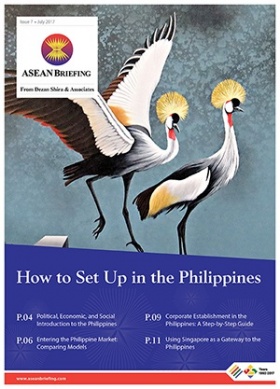IP Protection in the Philippines’ Food and Beverage Industry
By: South-East Asia IPR SME Helpdesk
The Philippines’ rapidly growing food and beverage (F&B) industry is one of the biggest contributors to the nation’s economy making up about half of its manufacturing sector and contributing about 23-24 percent of the country’s GDP. The Philippines is one of Asia’s largest producers of food, with the value of its food processing sector exceeding EUR 24 billion (US$28.75 billion). Given the Philippine government’s commitment to further developing the country’s F&B industry as one of the priority industries and opening it up further to foreign investments, the Philippines’ F&B industry has become even more attractive for European SMEs.
Propelled by increasing disposable income among its upper and middle classes and the proliferation of retail and shopping centers as well as a highly urbanized population, the Philippine’s domestic food and beverages market looks quite promising for European SMEs. The Philippines’ consumers appreciate the high quality and healthy nature of European food and beverage products. As a general trend, the Philippines’ young and fast-growing consumer base is gradually becoming more health-conscious and is increasingly willing to try out new products. As the spending power of the upper-middle and middle class is increasing, there is also greater demand for imported premium products, which offers many business opportunities for European SMEs.At the same time, together with rapid economic growth, counterfeiting in food products has also increased dramatically in recent years. Thus, EU SMEs should take steps to ensure that their IP rights are protected, when selling their food products to the Philippines, especially as failing to register IP rights in the Philippines could easily end SMEs’ business prospects in the country.
Trade mark protection is crucial in the F&B industry
Increasing brand consciousness, concerns about food safety and the relatively high number of counterfeiting in the country mean that brand reputation is especially important for the food and beverage industry. A trustworthy brand can be critical to the success of F&B products as company’s trade mark functions as a badge of quality in the Philippines.
SMEs planning to sell their food and beverage products in the Philippines, should register their trade mark in the country well in advance, ideally before even starting the business there since the Philippines applies a ‘first-to-file’ trade mark registration system, meaning that the first person or entity to register a trade mark owns that mark in the country, regardless of the first use. It is particularly important to register trade marks in the Philippines because ‘bad-faith’ registrations is still a major problem in the country. Bad-faith registrations exist where a third party (not the legitimate owner of the mark) first registers the mark in the Philippines, thereby preventing the legitimate owner from registering it in the country. These unscrupulous companies would normally try to resell the trade mark back to its legitimate owner at an inflated price. It is also not uncommon that these trade mark hijackers try to sue the original brand owner for allegedly violating their registered trade mark rights in the country. Cancellation of a prior registration is available when the trade mark has been registered in bad faith, but it could be costly, so it is wiser and cheaper to register the trade mark in the Philippines.
Trade marks can be registered in the Intellectual Property Office of the Philippines (IPOPHIL) and filing for trade mark registration costs between EUR 18 and 36 (US$ 21.5-43), excluding agent fees. Furthermore, it is wise to register a trade mark in the Philippines, as in addition to making goods and services distinctive, the owner of a mark may earn revenues from the use of the mark by licensing its use to other business entities or though franchising agreements.
European SMEs should keep in mind that according to the Trade Mark Law of the Philippines, in order to maintain the registration of a mark, a Declaration of Actual Use of the mark together with the proof of use of the mark must be filed after 3 years from the application date of the mark and then again within 1 year from the 5th anniversary of the registration. This is required to prove that the mark is in use, and that it is used consistently without substantial modifications as well as to try prevent a construed and obstructing system of trade mark cancellations.
In addition to direct national filing, EU SMEs may also seek to protect their marks in the Philippines as part of an international registration under the Madrid Protocol, subject to compliance to local requirements, (particularly with the filing of the Declaration of Actual Use). International registration under the Madrid Protocol allows SMEs to register their trade mark simultaneously in several countries.
Don’t forget to protect your Geographical Indications (GIs) in the Philippines
In the food and beverages industry, it is also important to protect GIs as these are also valuable for branding goods in the Philippines, especially as GIs can increase trust towards certain brands, since they identify the country, region, or area from which goods originate and to which a given reputation is assigned. Examples of such products include Bordeaux wine, Parmigiano-Reggiano cheese and Parma ham.
In compliance with the TRIPS Agreement, GIs are recognized and provided for in the Philippines IP Code. However, there is no established system yet for the regulation and registry of GIs in the Philippines. Efforts to formulate the regulations for GIs are still on-going. Until the said regulations are set in place, it is recommended for owners to register their GIs as collective marks, which usually follows the general registration procedure of trade marks but perform different functions.
Appearance matters: protect your packaging with design registrations
Creative packaging style is another key element for the success of the brand in the Philippines as the country’s consumers are gradually starting to pay more attention to the appearance of products and this is a relevant aspect to take into consideration in the food and beverage sector. It is, therefore, important to protect the design aspects of products to prevent counterfeiting and replication. Besides using trade marks, SMEs can protect their packages with industrial design patents in the Philippines.
An industrial design is the ornamental or aesthetic aspect of an article, i.e. the appearance of a product. The design may consist of three-dimensional features, such as the shape or distinct surface of an article, or of two-dimensional features, such as patterns, lines or color or the combination of both. When an industrial design is protected in the Philippines by registering it, the owner of the design is assured an exclusive right against unauthorized copying or imitation of the design by third parties.
In order to be registered in the Philippines, an industrial design must be any new or original creation relating to the ornamental features of shape, configuration, form, or combination thereof, of an article of manufacture, whether or not associated with lines, patterns or colors, which impart an aesthetic and pleasing appearance to the article.
An industrial design registration is valid for a period of 5 years from the date of the application and is renewable for two consecutive five 5-year periods by paying the renewal fee. The maximum total duration is 15 years. The industrial design can also be registered with the IPOPHIL and as with trade mark registration, the first-to-file rule also applies to industrial design registration.
SMEs should also keep in mind that original ornamental designs or models for articles of manufacture, whether or not they can be registered as an industrial design, are also subject to copyright. Thus, the appearance of SME’s products may be protected both under an industrial design registration and under copyright, giving an added layer of protection for SMEs’ package designs in the Philippines.
 RELATED: Managing Trade Secrets in Thailand
RELATED: Managing Trade Secrets in Thailand
Protect your Secret Recipes with Trade Secrets
A trade secret is a non-public information that is financially valuable and is guarded with confidentiality measures. In the food and beverage industry, trade secrets may refer to ingredients or processing methods that are critical to the taste, texture, appearance and smell of a product. A famous example is the Coca Cola formula that has remained secret for decades. European SMEs can protect their secret ingredients or processing methods with trade secrets in the Philippines.
While there is no independent trade secret law in the Philippines, trade secrets can be protected under Article 40(e) of RA 7394 or the Consumer Protection Act and Article 292 of the Revised Penal Code. However, given the lack of provisions for legal protection of trade secrets, SMEs should take practical steps to protect trade secrets; this includes inserting confidentiality provisions into employee contracts, who come into contact with SME’s secret recipes or production methods; internally restricting access to sensitive information and ensuring that confidential information is revealed on a need-to-know basis only and under Non-Disclosure Agreements or relevant clauses. These measures would help SMEs to still achieve sufficient protection for their trade secrets.
Additionally, European businesses should include confidentiality clauses within employee contracts covering not only the duration of employment, but even after the employee has left the company. It should also be of paramount importance to ensure that confidentiality agreements are signed with business partners whenever disclosing confidential information like the product recipe to them. Furthermore, companies wishing to get compensation for trade secrets revealed in the Philippines should stipulate contractual obligations to all parties involved and, resort to civil action for breach of contract and damages in the case of any violations.
About South-East Asia IPR SME Helpdesk
The South-East Asia IPR SME Helpdesk supports small and medium sized enterprises (SMEs) from European Union (EU) member states to protect and enforce their Intellectual Property Rights (IPR) in or relating to South-East Asian countries, through the provision of free information and services. The Helpdesk provides jargon-free, first-line, confidential advice on intellectual property and related issues, along with training events, materials and online resources. Individual SMEs and SME intermediaries can submit their IPR queries via email (question@southeastasia-iprhelpdesk.eu) and gain access to a panel of experts, in order to receive free and confidential first-line advice within 3 working days.
The South-East Asia IPR SME Helpdesk is co-funded by the European Union.
To learn more about the South-East Asia IPR SME Helpdesk and any aspect of intellectual property rights in South-East Asia, please visit our online portal at http://www.ipr-hub.eu/.
About Us
ASEAN Briefing is produced by Dezan Shira & Associates. The firm assists foreign investors throughout Asia and maintains offices throughout ASEAN, including in Singapore, Hanoi, Ho Chi Minh City and Jakarta. Please contact us at asia@dezshira.com or visit our website at www.dezshira.com.
- Previous Article Philippines Under Duterte: Opportunities and Risks
- Next Article Établissement d’Entreprise en Thaïlande : Ce Qu’il Faut Savoir












